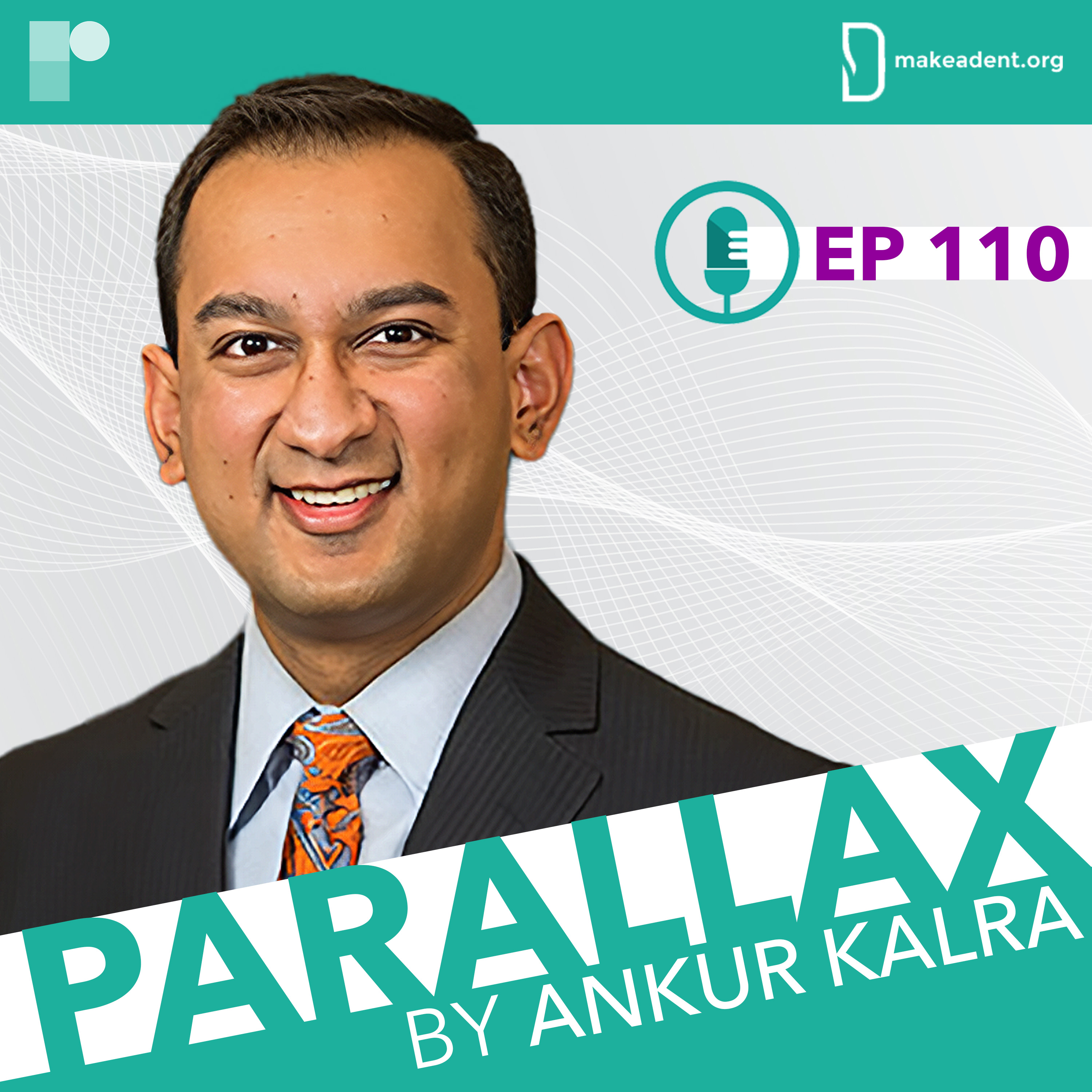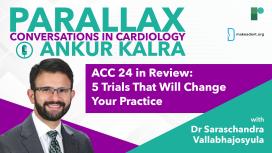
EP 110: Cultivating Leadership, Civic Duty & the Presidential Leadership Programme with Dr Sinha
In this week’s episode of Parallax, Dr Ankur Kalra welcomes Dr Shashank Sinha. Dr Sinha is an Advanced Heart Failure, Mechanical Circulatory Support, and Transplant Cardiologist at Inova Fairfax Medical Campus, where he serves as Co-Medical Director of the Cardiac Intensive Care Unit and Director of the Cardiovascular Critical Care Research Program. Additionally, he holds the position of Assistant Professor of Medical Education at the University of Virginia School of Medicine.
In this episode, Dr Sinha shares his insights on leadership after participating in the prestigious Presidential Leadership Scholars Programme. This programme, designed for mid-career professionals with 10+ years of experience, aims to foster bipartisan, action-oriented leaders. Dr Sinha discusses what motivated him to apply for the programme and guides us through the practical details of the process. Ankur asks him about his modules and the lessons he derived from this multidisciplinary programme.
Dr Sinha and Dr Kalra discuss civic duty and the values that can be nurtured to make a difference on a larger scale. Dr Kalra also asks about Dr Sinha's approach to conflict management and combating inherent bias.
What is the Presidential Leadership Programme? What qualities constitute a good leader? How can individuals foster their leadership skills?
Questions and comments can be sent to “podcast@radcliffe-group.com” and may be answered by Ankur in the next episode.
Guest: @ShashankSinhaMD Host: @AnkurKalraMD and produced by: @RadcliffeCARDIO
Read MoreRead Less

Dr Kalra and Dr Vallabhajosyula dissect the practical implications of the top 5 ACC.24 trials, answering pressing questions and addressing emerging dilemmas.
Read More
All Episodes

In our first episode, Ankur explains his vision for and inspiration to start ‘Parallax’, and speaks with Chad Kliger from Lenox Hill Hospital in New York about conduction abnormalities after transcatheter aortic valve replacement (TAVR/TAVI), a review article published in US Cardiology Review 13.1 Ankur and Chad look at conduction abnormalities after TAVR/TAVI with a focus on basic conduction system anatomy in relation to the aortic valve, the mechanism, incidence, predisposing factors for occurrence, impact on mortality and finally, proposed treatment algorithms for management. Hosted by @AnkurKalraMD. Produced by @RadcliffeCardiology.
Read More

According to Dr Eric Adler, at the core of all impactful research is a powerful narrative that makes us reflect on the human condition. In 2006, when the ground-breaking discovery was made that specialized cells can be turned into stem cells, Dr Eric Adler was thinking about how he could create a synergy between his passion for clinical work and his determination to ask compelling questions in research.
Parallax’s guest this week is Dr Eric David Adler, Medical director of heart transplant and mechanical circulatory support at UC San Diego Health.
Read More
Parallax’s guest this week is Dr Eric David Adler, Medical director of heart transplant and mechanical circulatory support at UC San Diego Health.

Dr Ankur Kalra’s guest is Dr Alin Gragossian, a critical care fellow, heart transplant recipient and advocate. In this episode, Alin talks about her journey as a patient, the psychological aspects of her recovery and her advocacy work. Ankur asks Alin about the mindset behind her sense of purpose and her dedication to help raise awareness of organ donation and young heart failure patients.
How did Dr Gragossian receive her diagnosis? How does she feel about her new reality? What drives her? What is her message to our listeners?
Read More
How did Dr Gragossian receive her diagnosis? How does she feel about her new reality? What drives her? What is her message to our listeners?

How can we use our power and privilege to serve? How did his experiences shape Dr Kelli to become an ambassador for his community? What is his message to our listeners?
Just after 9/11, Heval, the 18-year-old Syrian Kurdish refugee found a job as a dishwasher. At this point, he was the sole provider of his family. The pressure that comes from being poor did not leave him for many years. Today, he is firm believer in giving back to underserved communities by spreading awareness within the medical community. As he says, well-meaning people of privilege are sometimes afraid to act. What we need is more people to bridge the gap and find ways to help each other.
Read More
Just after 9/11, Heval, the 18-year-old Syrian Kurdish refugee found a job as a dishwasher. At this point, he was the sole provider of his family. The pressure that comes from being poor did not leave him for many years. Today, he is firm believer in giving back to underserved communities by spreading awareness within the medical community. As he says, well-meaning people of privilege are sometimes afraid to act. What we need is more people to bridge the gap and find ways to help each other.

Dr Sodhi remembers the first time she stepped into a Cath lab and found her passion. Years later she was preparing to do a complex TAVR procedure with her colleagues when suddenly they all recognised the significance of four women coming together in the lab. The photo of the four of them was shared widely on social media. For Dr Sodhi it became a symbol of what great mentorship can achieve, and for many others it is a beacon of hope.
What drives Dr Nishtha Sodhi? What were the formative moments of Dr Sodhi’s career? What are the new frontiers of cardiology?
Read More
What drives Dr Nishtha Sodhi? What were the formative moments of Dr Sodhi’s career? What are the new frontiers of cardiology?

In one of her many posts on Instagram, we can see Dr Hafiza Khan holding a table summarising her reactogenicity after her second COVID shot. In the frame next to her is her son listing his own reactions. In this episode, Ankur asks Hafiza to talk about Instagram and reaching millennial and gen Z audiences, as well as the importance of developing and maintaining trust between different communities at a time of information overload.
Read More






